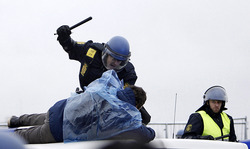230 protesters arrested trying to breach climate summit’s perimeter fence
Tom Whipple in Copenhagen
An attempt by more than 3,000 environmental activists to storm the perimeter fence of the UN climate talks and occupy the conference floor was quashed yesterday by Danish riot police using batons, teargas and pepper spray.
It led to renewed accusations of heavy-handed policing over the use of teargas and mass detentions in controlling demonstrators at the Copenhagen summit.
More than 230 people were arrested and at least ten injured in the clashes. Several thousand protesters had assembled yesterday morning near the Bella conference centre with the idea of convening a people’s assembly inside. Instead they were met by police in full riot gear, and held in a cordon beyond the main entrance.

Several hundred others were detained before even reaching the centre using a new law of pre-emptive arrest, brought in before the conference, which enables police to hold for up to 12 hours those they suspect may break the law. Patrick Gillett, 25, from London, spoke to The Times from Copenhagen’s temporary Climate Jail, a requisitioned warehouse on the city outskirts designed to process hundreds of arrests a day.
“We were pre-emptively arrested as we cycled in,” he said. “They picked everyone in sight, before we had even done anything. Some other people in our group hid, and were chased by police dogs and bitten. One was bitten so severely that she was taken to hospital; she was just 18.”
One British activist, who didn’t want to be named, said that he twice had to kick back teargas canisters. “It was like a game of footie,” he said. “The police were being brutal but none of the protesters threw stones or anything back at them.”
Anna Sanne Göransson was sprayed in her eyes with pepper spray when trying to climb the perimeter fence. Speaking to The Times as she was helped by a medic, the Danish activist said she was surprised by the police response. “I was very polite to them,” she said. “Our intention was only to be open, peaceful and democratic, and they knew that.”
Climate Justice Action, the umbrella group that organised the protest, defines its goal as to be a confrontational mass action of non-violent disobedience. Natalie Swift, from the group, said: “We’re seeing protesters being violently prevented from exercising their democratic rights.”
As the stand-off entered its third hour, the police were instructed to stop tightening the cordon and allow protesters to leave. David, a German protester who didn’t want to give his surname, said that the change in policing meant that at least the day was not wasted. “When a policeman stands in front of me, takes off his helmet and hugs a clown that’s a success,” he said.




